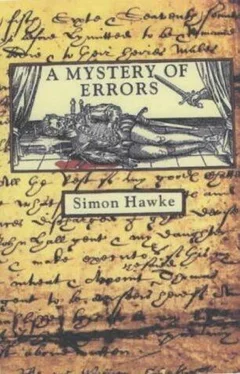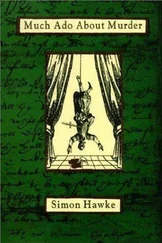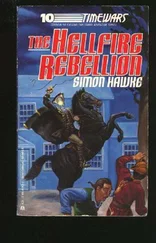Simon Hawke - A Mystery Of Errors
Здесь есть возможность читать онлайн «Simon Hawke - A Mystery Of Errors» весь текст электронной книги совершенно бесплатно (целиком полную версию без сокращений). В некоторых случаях можно слушать аудио, скачать через торрент в формате fb2 и присутствует краткое содержание. Жанр: Исторический детектив, на английском языке. Описание произведения, (предисловие) а так же отзывы посетителей доступны на портале библиотеки ЛибКат.
- Название:A Mystery Of Errors
- Автор:
- Жанр:
- Год:неизвестен
- ISBN:нет данных
- Рейтинг книги:3 / 5. Голосов: 1
-
Избранное:Добавить в избранное
- Отзывы:
-
Ваша оценка:
- 60
- 1
- 2
- 3
- 4
- 5
A Mystery Of Errors: краткое содержание, описание и аннотация
Предлагаем к чтению аннотацию, описание, краткое содержание или предисловие (зависит от того, что написал сам автор книги «A Mystery Of Errors»). Если вы не нашли необходимую информацию о книге — напишите в комментариях, мы постараемся отыскать её.
A Mystery Of Errors — читать онлайн бесплатно полную книгу (весь текст) целиком
Ниже представлен текст книги, разбитый по страницам. Система сохранения места последней прочитанной страницы, позволяет с удобством читать онлайн бесплатно книгу «A Mystery Of Errors», без необходимости каждый раз заново искать на чём Вы остановились. Поставьте закладку, и сможете в любой момент перейти на страницу, на которой закончили чтение.
Интервал:
Закладка:
Wait, he had told her. What was it? She racked her brain. Something rather common, and yet uncommon. It tripped rather fetchingly off the tongue, as she recalled. But what was it? Smythe! That was it! Something Smythe… Something Smythe… Symington! Symington Smythe!
She had a witness. A witness who could corroborate that she’d been at the Theatre that night. And that she had met Drummond! She had to find him. And as soon as possible. He was her only chance to prove that she had told the truth. She got up and quickly started to change her clothes.
8
Green Oaks, the sprawling estate of Sir William Worley, was one of the most palatial homes that Smythe had ever seen. He had heard that the queen herself often visited Green Oaks, usually in late June or early July, when she would habitually leave London in procession with her entire court and make her summer excursions through the countryside, staying at various private residences. Green Oaks was where she usually began. Ostensibly, these excursions were a way for the queen to go out among her subjects every year and see some of the land she ruled. Co-incidentally, they also got her out of London during the height of the plague season and allowed her to vacation in the country at the expense of her hosts. And these royal visits could apparently be quite expensive, as they required that the queen be entertained and could last anywhere from a month up to six weeks, or whenever the queen grew bored and decided to move on. It was not unusual for one of Her Majesty’s hosts to shell out from two to three thousand pounds to pay for such a visit, but most considered the princely, indeed, the queenly sum well spent in exchange for the favor and influence they believed it could procure.
Obviously, if Sir William could afford to entertain the queen in such a fashion on an annual basis, he had to be fabulously wealthy, and his estate gave ample testimony to the size of his fortune. Located well outside the London city limits, on several hundred lushly wooded and meadowed acres, the house was a huge, rough-hewn, gray stone edifice laid out in the shape of the letter “H,” with a windowed hallway as the cross-stroke separating two large interior courtyard gardens.
Smythe had ridden one of the stable post horses out to the estate and as he trotted up the road leading to the house, he wondered what would come of this visit. He had not yet made up his mind about Sir William, but more to the point, he wondered if Sir William had made up his mind about him. He knew that he could very easily disappear during this visit, never to be seen again, and no one would ever think that Sir William could possibly have had anything to do with it. Only Shakespeare would know, or at least suspect what might have happened, and who would listen to a penniless young poet? Especially when it was his word against that of one of the richest men in the land.
As Smythe turned his mount over to one of the servants who came out to meet him, he gazed up at the imposing residence and took a deep breath, marshaling his courage. Just the idea of a visit to such an opulent place would ordinarily have been enough to make him feel intimidated, much less visiting it under such peculiar and possibly even dangerous circumstances. The man who lived here was not only one of the richest and most influential men in the country, he was also a brigand who robbed travelers on the roads leading to London, a flamboyant highwayman who called himself Black Billy. It seemed absolutely insane. And yet, Smythe knew it to be true. And Sir William knew he knew.
What Smythe couldn’t understand was why. The man seemingly had everything. Entering the house, he could see walls paneled in imported woods and hung with rich tapestries, ceilings patterned with delicate plaster ribs forming arabesques, geometrical forms and figures of birds and beasts, each room different from the other. There were ornate staircases, some straight, some spiraled, with solid oak block steps and massive handrailings and newel posts, all heavily and intricately carved by master artisans.
He was conducted to a great hall with a long gallery, just like in a castle throne room, from which people could look down on what was happening below or, alternatively, Smythe thought, from where archers could shoot down at anyone who was being a boorish guest.
He grimaced. The suits of armor standing at either side of the entrance to the chamber had given his mind an unpleasantly martial turn, as did the maces and the battleaxes and the morning stars hanging on the walls, alongside pikes and halberds and great swords and shields and bucklers. It looked like the armory at Tower of London, another place he was anxious to avoid.
I’ve made a mistake in coming here, he thought. There was nothing to be served in doing this. He did not belong here. Was assuaging his curiosity truly worth taking such a risk? He decided, despite his apprehensions, that it was. It could have been pure chance that he had happened on Black Billy on the road to London. Shakespeare had not run into him. The poet had not, in fact, run into any robbers at all on his way from Stratford, but perhaps that was because he had not been traveling alone. He had said that he had fallen in with a company of travelers for the sake of safety in numbers. It must have worked. Smythe had traveled alone and been accosted several times. So, perhaps it was mere chance. But then to run into him again in London, in that tavern-and in the company of Marlowe, when it just so happened that he, too, was in the company of a poet, albeit one who was not yet successful-it simply seemed as if there were some fateful influence at work here. And Sir William had invited him, after all. If he had wanted to dispose of him, he would certainly not have needed to invite him to his home. Assassins could be hired cheaply from among the men who loitered around Paul’s, cheap even for men with far fewer resources than Sir William could command.
“Young Master Smythe, was it?”
Smythe turned to see Sir William entering the hall. He was dressed very plainly in black doublet and hose, and a pair of silver buckled shoes. “Aye, sir,” Smythe replied. “Though I cannot truthfully call myself a master of any art or craft. Did I come at an inconvenient time, milord? I could easily come back another day, if you prefer.”
“Nonsense. Today is perfectly convenient. And you are welcome at Green Oaks. May I offer you some wine?”
“You are most kind, Sir William, but I would not wish to put you to any trouble on my account.”
“Trouble? I have more wine in my cellars than I could possibly drink in a lifetime. Someone’s going to have to help me drink it, you know. It can’t all go down Her Royal Majesty’s alabaster throat. And I would much rather it be an honest man who drank my wine than all those dissipated hangers-on at court.”
Smythe smiled, despite his discomfort. “In that event, milord, it would be both an honor and a pleasure.”
“Excellent. You should find a decanter of port and several glasses over on the sideboard there. Be a good fellow and pour us both a drink. I have given strict instructions that we are not to be disturbed.”
Smythe glanced back at him as he made his way over to the heavy, carved mahogany sideboard. “That sounds rather ominous, milord.”
Worley raised his eyebrows. “Does it? Are you afraid that I shall do away with you in here and secret your body underneath the floorboards? ‘Twould eventually make the room smell rather piquant, don’t you think?”
Smythe brought him a glass of port. No pewter or clay goblets here, he thought, but the very finest glassware. “To be sure, milord. In any event, ‘twould be a far more elegant resting place than a man of my lowly station would deserve.”
Читать дальшеИнтервал:
Закладка:
Похожие книги на «A Mystery Of Errors»
Представляем Вашему вниманию похожие книги на «A Mystery Of Errors» списком для выбора. Мы отобрали схожую по названию и смыслу литературу в надежде предоставить читателям больше вариантов отыскать новые, интересные, ещё непрочитанные произведения.
Обсуждение, отзывы о книге «A Mystery Of Errors» и просто собственные мнения читателей. Оставьте ваши комментарии, напишите, что Вы думаете о произведении, его смысле или главных героях. Укажите что конкретно понравилось, а что нет, и почему Вы так считаете.












